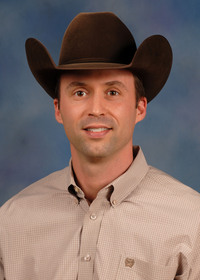Information Possibly Outdated
The information presented on this page was originally released on April 3, 2000. It may not be outdated, but please search our site for more current information. If you plan to quote or reference this information in a publication, please check with the Extension specialist or author before proceeding.
Horses Require Time, Money From Owners
By Suzanne Berry
MISSISSIPPI STATE -- Horses are an integral part of the lives of many Mississippians, but owners should consider the cost of their breeding, training, events, healthcare, shoeing, stabling and feeding.
Providing quality feed and care for horses is important for horse owners not only because they are sometimes considered part of the family, but also because horses are a major investment.
More than 335 horse enthusiasts from around the region recently had an opportunity to learn more about taking care of their animals. Equine Focus 2000, an all-day educational event, was sponsored by Mississippi State University and Cargill-Nutrena Feeds.
"We felt there was a need to bring together knowledgeable speakers and present valuable information on a variety of topics to horse owners in the region that they may not otherwise have available to them," said Brett Scott, 4-H horse specialist with MSU's Department of Animal and Dairy Science and coordinator for the event.
Pete Gibbs, Extension equine specialist from Texas A & M University, was the keynote speaker and discussed functional diets for different levels of performance. He said the largest expense involved with owning a horse is feeding it. Nutrition requirements vary to some degree based on the level of activity or performance that is required of the horse.
If a horse is strictly used for pleasure riding once in a while rather than one used for endurance racing, the nutritional requirements will be vastly different as will the cost of providing feed to the animal.
Other topics presented during Equine Focus 2000 included diseases, body weight estimates, first aid, exercise programs, conformation basics and safety issues. Staff members from MSU's College of Veterinary Medicine presented the material.
"I want to learn all I can so I am able to save my friend's life with the knowledge that I've acquired," said Larry Brock, who owns a boarding stable in Meridian where he trains endurance horses.
Horse owners are not the only group receiving advice from MSU's Animal and Dairy Science Department. Mississippi cattle producers will be the next group targeted for an in-depth educational workshop.
Cattlemen's College, an educational session similar to Equine Focus 2000, will take place April 29 at MSU's AgriCenter. Topics based on trends aimed at improving beef industry profits include ongoing research on new forages, feedlot research, heifer development, electronic estrous detection and estrous synchronization will be presented. For more information, contact the local county Extension office or MSU's Animal and Dairy Science Department at (662) 325-2802.
Contact: Brett Scott, (662) 325-3515


